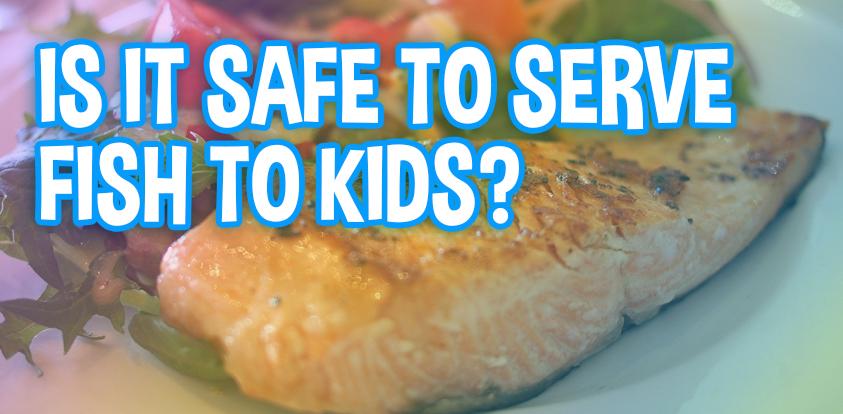
Is It Safe To Serve Fish To Kids? Concerns About Mercury and More!
Share

During pregnancy, I received an untold number of warnings about not eating fish. Now that my kids are out and running around, should I still avoid fish? What kinds of fish are prone to higher levels of mercury that can lead to the ill effects of mercury poisoning? There is a lot to consider when serving fish to kids. This blog is meant to help you make the right decisions when it comes to feeding fish to children, so let's get started!
Of course, if you want some healthy kids snacks that don't incorporate fish, we've still got you covered.

The Risks
Obviously mercury poisoning is one of the biggest concerns that parents have about feeding fish to their children. Mercury poisoning is bad news and can lead to muscle weakness, slow cognition, impaired motor skills, delayed speech, and language development. The good news is that mercury poisoning isn't a huge concern when considering the most commonly eaten kinds of fish in the USA.
How about bones? Depending on the age of your kids they might not be ready for anything except fish filet. One overlooked bone can lead to disaster so I'd suggest playing it safe. If you insist on serving grilled fish (as we tend to do while camping) then it's wise to sort through your kids' servings thoroughly to get rid of any bones. Choking on a bone is an easy way to turn your little ones off of fish forever.
What about sushi or sashimi? I would definitely not suggest feeding a child raw fish until they're in the teenage years. As a matter of fact, I wouldn't feed sushi to anyone without complete certainty that it has been prepared correctly. Raw fish is a particularly comfortable home for nasty parasites if the fish isn't treated properly. Usually, this treatment involves a thorough deep freeze but some restaurants (particularly lower-end ones) might not bother. It's a roll of the dice, and I don't take chances when it comes to my progeny.

Fish and Mercury
When considering how likely a fish is to contain mercury the first thing to consider is its location on the food chain. All fish ingest small amounts of mercury, but fish that eat other fish accumulate all of the mercury from each fish that they eat. This means that algae or plankton-feeding fish are the safest to consume, but the risk grows as you get higher up the food chain.
This means that the top predators are carrying the highest chemical load. Sharks, swordfish, bigeye tuna, and king mackerel are all fish that need to be strictly avoided during pregnancy. I probably wouldn't feed them to children either. Even as a grown adult, I only enjoy swordfish on very rare occasions. Which seafood has the least amount of mercury? Sardines, herring, cod, tilapia. Basically anything that isn't eating their fellow fish. That also includes shellfish like crab and oysters.
The Change Up
Even if you're consuming fish with a relatively low amount of mercury, repeated exposure does add up over time. I know tuna is a family favorite but eating the same thing over and over will lead to exposure to the same contaminants. It can be extremely helpful to substitute tuna for salmon or some other kind of white fish to prevent overexposure to certain chemicals that might be found only in tuna. Tuna is, of course, just an example. Consuming any kind of fish too often can lead to some ill effects.

Mislabeled Fish Abounds
Back in 2018 Oceana ran a study to determine how often fish was being mislabeled and sold as something that it wasn't. The results were much higher than you might assume. 20% of fish samples taken in the study were actually labelled incorrectly. No matter your best intentions, it's possible that you're feeding your children mislabeled fish that you wouldn't normally give the green-light simply because they are labelled as something else!
Examples found in the study included "tilefish sold as red snapper and halibut, and king mackerel sold as grouper." If you'll recall, king mackerel was one of those high mercury fish sitting happy at the top of the food chain. This is one of the reasons that I swear by purchasing whole fish and filleting it myself if needed. A good filet knife makes it a snap! My knowledge of fish isn't extremely intimate but it's much easier to tell a red snapper from a tilefish if they're still intact.
I enjoy shopping locally at small shops often, but Oceana's study seems to suggest that larger chain supermarkets are less likely to make mistakes than smaller stores or even restaurants. The biggest factor for determining whether or not a fish is actually what it's labeled as is the price. Know how much grouper costs and realize that prices that are too good to be true usually aren't true. Keep your eyes peeled for fishy deals. Forgive me for the pun.
Final Thoughts
Keeping your eyes open for fish is nice, but keeping your nose open for fish is much less pleasant. Instead of sitting and dealing with the scent of lingering fish after a hearty meal you can alleviate your nose with our grape deodorizer spray or bubblegum deodorizer spray! They can be used to fight stinky feet, but even spraying it around the house can work wonders for your nose.
